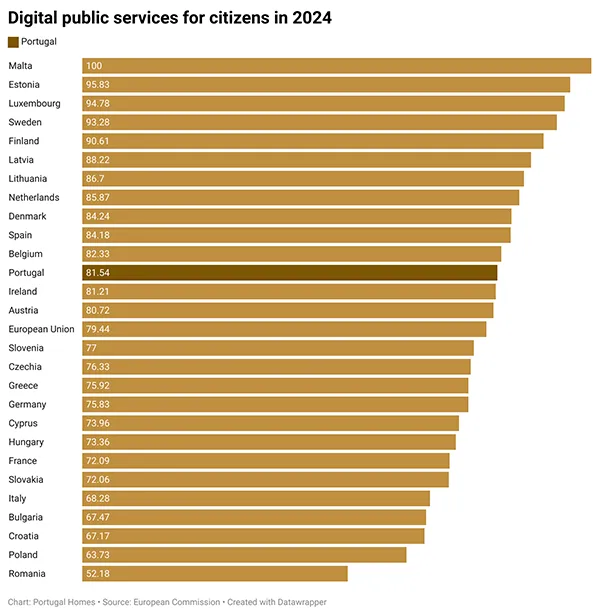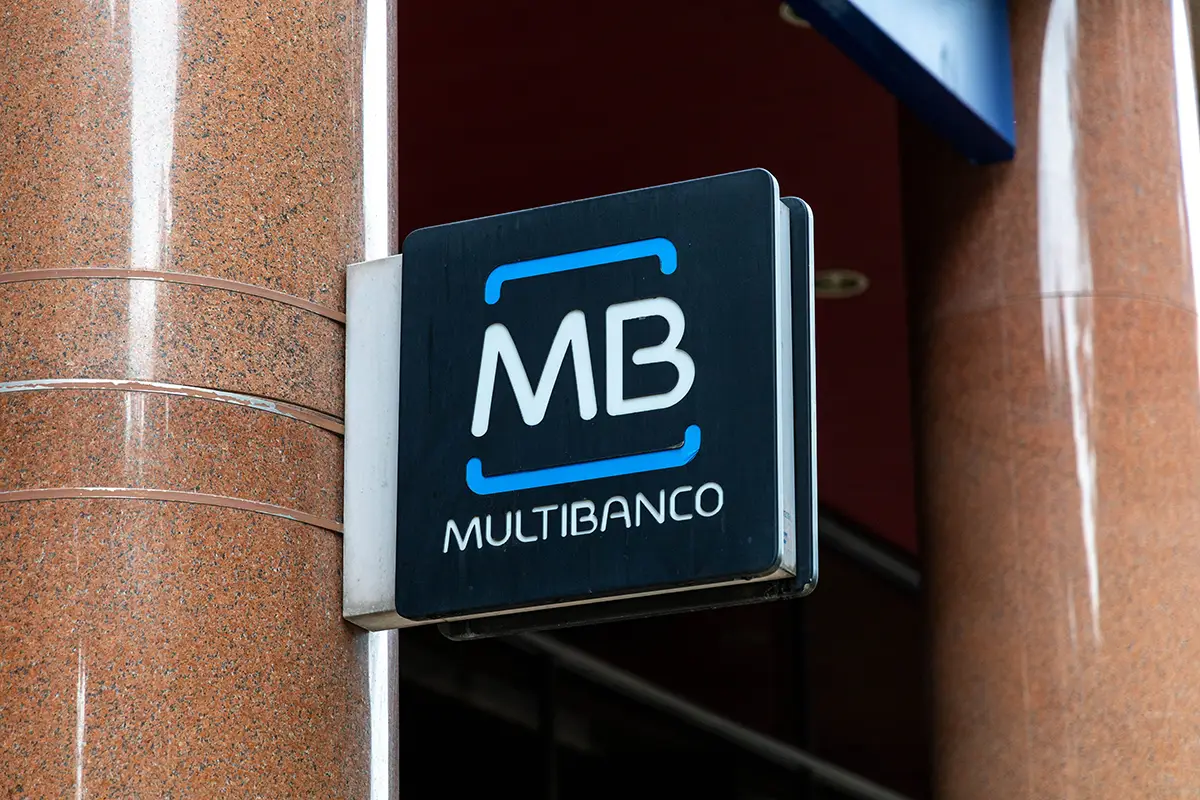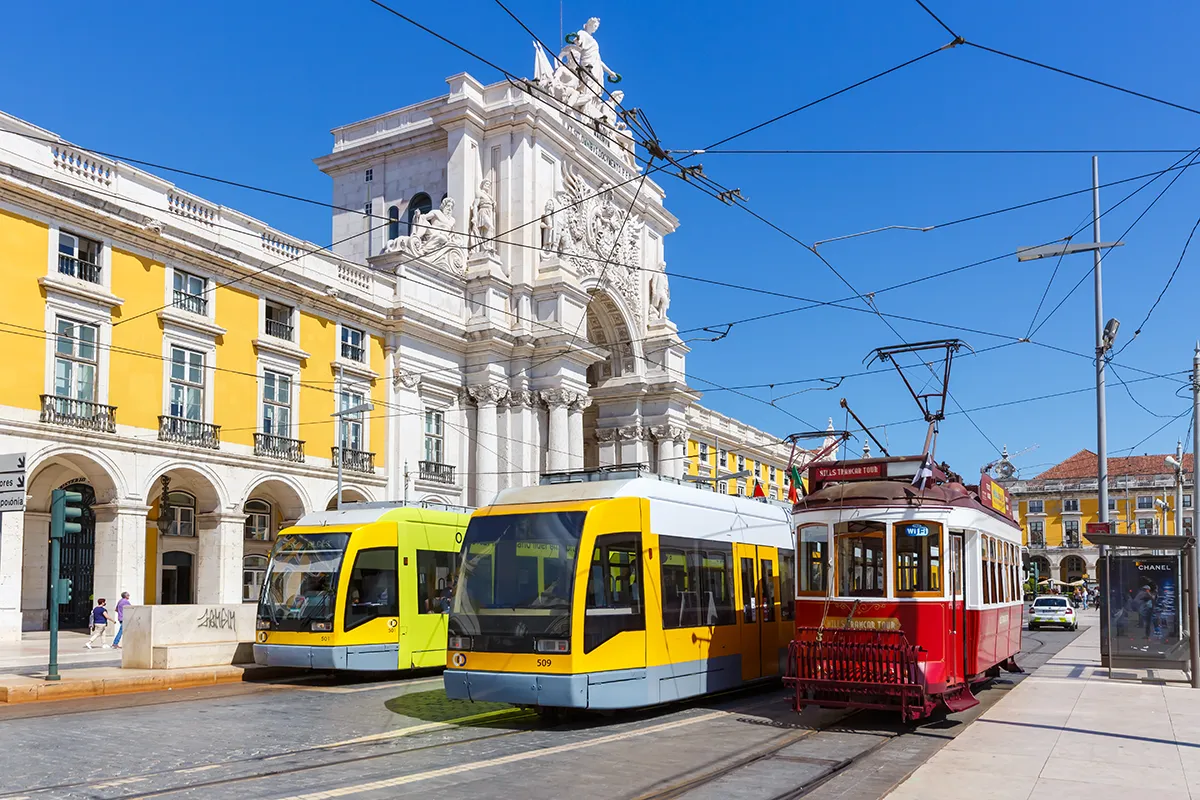
In the past decade, Portugal has initiated an outstanding plan to modernise the country, making significant strides in digitalising and modernising its public infrastructure. This progress has greatly enhanced convenience for both residents and tourists. From daily transportation to healthcare, the Portuguese government is leveraging technology to streamline services, reduce bureaucracy, and improve the overall quality of life. In this article, we explore several key initiatives highlighting Portugal's commitment to digital transformation.
The Portuguese Digitalisation and Modernisation of the Public Sector in 2024
One could argue that Portugal began its digitalisation efforts later than countries like the U.S. and Japan, where digital public services have been available for more than 20 years. However, this small Iberian country is at the forefront of tech development in Europe, even when compared to larger nations such as Germany and France.
The European Commission monitors Member States' digital progress through the Digital Decade Policy Programme 2030, which tracks progress towards digital targets. Portugal has shown impressive results, surpassing the EU average in indicators such as Digital Public Services for Citizens. This indicator measures the share of administrative steps that can be completed online for major life events. In this regard, Portugal ranks higher than Germany, Italy and France, revealing the country’s compromise to digitalisation in public services for its residents and citizens – see the complete rank below.

For several years, Portugal has been implementing a robust plan to digitalise public services and modernise the country’s infrastructure. The recently elected government continues this progress and in July, it introduced the latest plan for digitalisation and, also, for reducing bureaucracy in Portugal, comprising 15 basic policies that aim to standardise and simplify procedures regarding digital bureaucracy in public services. Keep reading this article to understand all those steps.
Read More on this topic:
Portuguese Prime Minister Presents Programme to Simplify Bureaucracy
Portuguese Passport Will Now Be Valid for 10 Years
New Portuguese Government Announces 4-Year Executive Plan
Portuguese Banking Integration and MBWay
An important feature of the Portuguese banking modernisation and digitalisation is the Multibanco (MB) System. The MB simplifies banking operations in Portugal by connecting all major banks through a single network, making it the default term for ATMs and also for when customers decide to pay a bill with a debit card. With over 11,000 ATMs, primarily in Lisbon, Porto and the Algarve, but also available in the countryside areas, it provides widespread accessibility. Besides typical ATM services like cash withdrawals and banking transfers, Multibanco ATMs allow users to pay taxes, charge prepaid phones and monthly transportation cards.

Most Portuguese bank cards seamlessly integrate with both the Multibanco and Visa or MasterCard networks. SIBS, the company behind Multibanco, also offers MBWay, a mobile app for ATM functions, including cash withdrawals via code and instant money transfers. This forefront digital innovation is particularly strong with the integration of MBWay features. This mobile payment platform allows users to transfer money, pay for goods and services, and manage their finances directly from their smartphones, without the necessity to carry with you of a physical card. The widespread adoption of MBWay has made everyday transactions faster in Portugal and more convenient, contributing to the overall digitalisation of the country's financial services.
Enhancing security, MBWay also enables the creation of virtual credit cards for unique online purchases. Recent improvements include a Bank of Portugal directive ensuring account holder names appear in all online transfers and direct debits, reducing fraud and errors. Another directive mandates banks to enable money transfers using just phone numbers, mirroring one of MBWay’s most popular functionalities, and offering consumers more convenient banking options.
If you want to know even more about this topic, Portugal Homes prepared a complete guide on the banking integration in Portugal.
See our complete Banking Guide here:
Banking in Portugal – Everything Expats Need to Know
Public Transportation on Digital Modernisation: Monthly Pass and Carris Way
One of the most notable advancements in Portugal's digital modernisation is reflected in Lisbon's public transportation system, with the introduction of online ticket purchases through the Carris app. This new digital solution, implemented in August 2024, allows residents and tourists to purchase and renew their travel passes online, eliminating the need to visit physical kiosks. The process is straightforward, accessible via a dedicated app, and significantly reduces hold ups and queues at stations. This is not the first time Carris, Lisbon’s official public transport operator, has innovated towards the digitalisation of its services. All Carris transports are already equipped with CarrisWay, a digital system that allows payments via MBWay (QRcode) or credit card directly on the ticket machinery. Additionally, it is possible to load various other transport titles onto the personalised Navegante card, including free passes (available for students and the elderly residents and citizens).
Lisbon’s transport system also includes the Fertagus train company, which connects the Portuguese capital with the South Bay region. Since 2021, Fertagus has offered a solution similar to CarrisWay, allowing users to load their Navegante pass through the Pick Hub app, developed by Ubirider. The digital solution helps thousands of users every month, without the need of physical contact.
Want to know more about public transportation in Portugal?
Portugal Travel: How to get around Portugal?

Digital Parking Solutions and Via Verde, a Portuguese Brilliant Innovation
Following the transportation topic, we cannot overlook the excellent digital tool available for those who want to park in the Lisbon Metropolitan region. To avoid unnecessary fees for incorrect parking, this digital process became more convenient with the introduction of online parking ticket purchasing. The EMEL (Lisbon Municipal Mobility and Parking Company) app allows users to pay for parking through their smartphones, making the parking meter obsolete, with seamless MBWay integration. This way, the EMEL app offers a digital solution not only because it simplifies the process of finding and paying for parking but also supports environmental goals by reducing the need for paper tickets and cash transactions. This digitalisation has been in place since 2014 and covers all areas where EMEL has concessions.
Another brilliant Portuguese innovation that significantly enhances daily life is Via Verde. This system, initially designed for electronic toll collection on Portuguese motorways, has evolved to offer a wide range of services. Via Verde enables drivers to automatically pay for parking, fuel, and even drive-through services without leaving their vehicles. This convenience reduces waiting times and streamlines various transactions, making everyday activities faster and more efficient. By integrating with multiple service providers, Via Verde ensures seamless experiences for users, reflecting Portugal's commitment to innovative solutions that simplify and improve daily life.
Portuguese State Digitalisation and Simplifying Bureaucracy in 15 Basic Policies
Focusing on the modernisation of the public sector, the recently elected Portuguese government presented at the beginning of July 2024 a programme of 15 basic policies, around four main axes, that aim to standardise and simplify procedures regarding the digital bureaucracy, including an important update for expat communities. The initiative aims to digitise public administration processes, making them more efficient. The creation of the Council for Digital Administration exemplifies this commitment, focusing on reducing administrative burdens and promoting transparency in public services.
The plan addresses the problem of over bureaucracy by interdepartmental connectivity within public administration, making services more user-friendly, particularly for foreigners' expats. A key initiative is the establishment of new Lojas do Cidadão (Citizen Shops), which will enable individuals to obtain essential public ID numbers, such as Finance, Social Security, and Health User numbers, simultaneously.
Read more about the policy through Portugal Homes Guide:
Portuguese Prime Minister Presents Programme to Simplify Bureaucracy

Advancements in Digital Health with the Portuguese Universal Healthcare
Portugal's universal healthcare system has seen significant improvements through digitalisation in the recent years. The government has invested in enhancing digital health indicators, making healthcare services more accessible and efficient. Key developments include telemedicine services, electronic health records, and digital prescriptions. These advancements ensure that patients receive timely care and that healthcare providers can operate more efficiently, ultimately improving public outcomes.
In Portugal, the Serviço Nacional de Saúde (SNS) is the cornerstone of the universal healthcare system, providing comprehensive medical services to all residents. The SNS offers a user-friendly app that gathers health-related information, making it easier for patients to manage their information. Through this app, users can access their medical records, schedule appointments, receive test results, access prescriptions from both public and private providers, and even get reminders for upcoming check-ups or vaccination appointments. This digital tool centralises and streamlines access to healthcare services, improving patient engagement and facilitating better management of personal health information. The SNS app exemplifies Portugal's commitment to leveraging technology to enhance the efficiency and accessibility of its universal healthcare system.
Read more about Portugal's Universal healthcare system:
Healthcare in Portugal for Expats & Foreigners
AIMA Initiatives Towards Digitalisation of the Immigration Service
With all this in mind, you would think ‘but how’s the public service for immigrants in Portugal?’. Yes, this has been a point of complaining in Portugal for several years among the expat community, especially in regards of the residency documents requests, but we have good news for you, as various initiatives under the Agency for Integration, Migration, and Asylum (AIMA) are driving digital transformation within public services. These initiatives focus on enhancing the digital infrastructure, promoting e-governance, and improving the overall efficiency of public administration for immigrants. Through continuous innovation and investment in technology, AIMA aims to create a more responsive and effective public sector already in 2024, with a robust plan of reducing the big residency application queues to zero.
AIMA's strategy to simplify processes involves implementing integrated digital platforms that consolidate various public services into a single interface, reducing bureaucracy and improving user accessibility. This approach includes the development of user-friendly online portals and mobile apps that enable citizens to perform administrative tasks, such as applying for permits or accessing government services, with greater ease. By streamlining procedures and automating routine tasks, AIMA is working to minimize waiting times and eliminate redundant paperwork. Additionally, the use of data analytics will help optimise service delivery and identify areas for further improvement, ensuring that public services are not only more efficient but also more aligned with the needs of the citizens.
Do you want to know more about AIMA?
Understand AIMA, the new Portuguese Immigration and Borders Agency
Lawyers will help AIMA to regularise immigrants in Portugal
Streamlined the Portugal Golden Visa Digital Process
Portugal's Golden Visa programme has also embraced digitalisation. The majority of the application process can now be completed online, significantly reducing the need for physical presence in the country. In 2024, the Golden Visa programme has grown towards the Investment Funds option, allowing non-European investors to gain EU R esidency in Portugal. Currently, the application is made entirely online, with the only physical need for the applicant during the biometrics data collection. Overall, the programme only requests 14 days of physical presence in the country every two years, making it almost entirely online process.
This shift not only makes it easier for international investors to participate in the programme but also enhances Portugal's appeal as a destination for global talent and investment. As a result, the bureaucratic hurdles have been lowered, facilitating smoother and quicker processing of applications
Portugal Homes as Your Trusted Partner: From In-Person to Digital Support
Portugal Homes has successfully handled thousands of Residency by Investment (RBI) applications, boasting a remarkable 100% success rate with our clients. With a deep understanding of the Portuguese system, procedures and a commitment to staying up to date with the latest news and developments, the team at Portugal Homes is highly skilled with everything Real Estate & Residency by Investment. Our expertise is matched by a dedication to offering comprehensive and personalised support throughout the application process.
In today’s digital age, Portugal Homes adeptly combines traditional and modern methods of client engagement. We provide a variety of services to accommodate both in-person and virtual interactions, ensuring clients receive the most convenient and effective support. For those who prefer face-to-face consultations, Portugal Homes offers in-person meetings to navigate RBI complexities. As for September 2024, Portugal Homes team of advisors will be travelling to the U.S. and Canada for a series of private meetings with former and also new clients, where we will go through all the nuances of the Golden Visa Programme in Portugal, as well as the D2 Visa, a business visa that allows non-Europeans investors to gain the Portuguese Residency and Citizenship.

Additionally, recognising the need for flexibility and accessibility, Portugal Homes provide complimentary online meetings and consultations for everyone interested in knowing more about the Portuguese Residency. This digital approach enables investors to connect with our advisors from anywhere in the world, facilitating real-time discussions and updates about their application status and any new developments and current assistance on their journey to securing Portuguese Residency.





